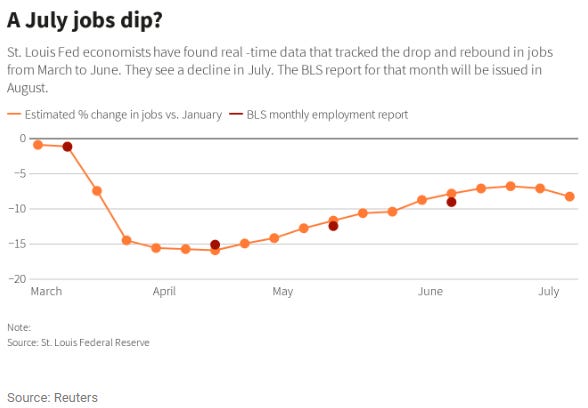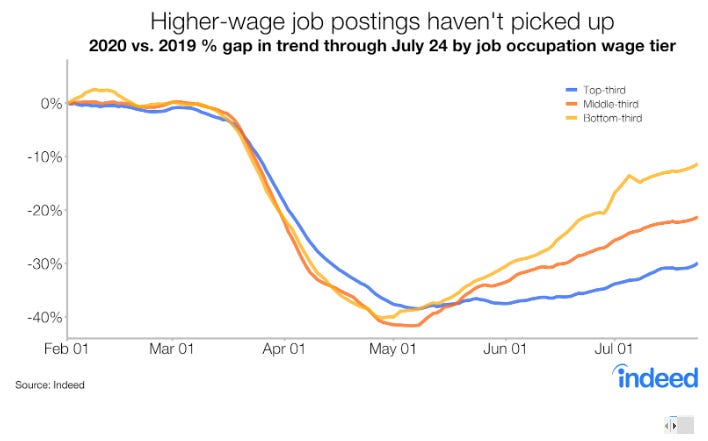Thoughts From The Divide – Giant Sucking Sounds
It’s another week of déjà vu, with both an FOMC meeting beginning today and an announcement that the alphabet soup of lending facilities has been extended. If Russell Napier is correct in his analysis (as discussed in last week’s newsletter), the ongoing Congressional negotiations on the next 1$ trillion plus stimulus are far more important. But in the meantime, there appear to be a number of “giant sucking sounds” across a number of markets as some CARES Act plugs are pulled.
(F)Unemployment?
One of the big questions for the next round of CV-19 aid is how it will help the unemployed. The $600-dollar Pandemic Unemployment Assistance bonus is set to expire this week, and the Dems and GOP are at odds about how much unemployment benefits should be boosted going forward. Meanwhile, as Christophe Barraud explains in brief, “high frequency indicators confirmed that economic recovery has stalled since late June. More specifically, the employment market has showed signs of weakness”. Citing both the Census Bureau’s Household Pulse Survey, and the St. Louis Fed’s Homebase-based forward indicator, Barraud warns, “it seems that the employment situation no longer improved and even deteriorated slightly in July compared to June”.
Indeed’s Hiring Lab data paints a slightly different picture of the labor market. While down more than 20% on a year on year basis, Indeed’s job posting’s have gradually improved since May 1. However, though “lower wage industries have lost the most jobs in the pandemic, by a wide margin”, Indeed has seen different dynamics in job postings: “job postings for higher-wage occupations have fallen the most”.
“Wouldn’t move if you put 4,000 volts through it”
In addition to discussing how to help workers, the Feds (and the Fed) are trying to find ways to help (small?) businesses, including considering changing the rules on liability and expanding the ways to get cash to those in need, including through a repeat of PPP. While this sounds like a good idea, the latest data from Yelp indicates that such efforts may be too late, as many businesses have “joined the choir invisible”. Yelp finds that while “some industries have been able to slowly bounce back with fewer temporary closures”, “permanent closures have steadily increased since the peak of the pandemic”, “with permanent closures now accounting for 55% of all closed businesses since March 1”. Permanent closures could mean even further deterioration in the prospects for commercial real estate, just as the residential market is set to be shaken up by the looming end of the eviction moratorium, as highlighted by CNBC and then AOC. One almost feels for the Fed, who like the pet shop worker, may have just wanted to be lumberjacks.







